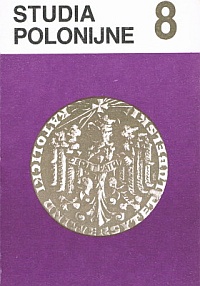Problem kulturowej tożsamości
Main Article Content
Abstrakt
The problem of cultural identity of ethnic communities has been recently rising up on all continents. It has been noticed in the United States that there is a group of uprooted people having neither cultural heritage nor cultural identity.
What does cultural identity of an ethnic group or community consist in? Culture constitutes the quality of human needs (both intellectual and material), the ways of satisfying them, behavioral patterns, systems of social activities, and the supply of goods and inherited values (both acquired and created) in the situation of social perception. Moreover, culture is of social character and never constitutes a monolith. It consists of a number of elements which are either common or else characteristic of a given ethnic community designating its identity.
Identity can be viewed upon either as an action or as a state. While considered as the action, identity consists in acquiring the goods and values, making use of them and co-creating them. Therefore, T. Parsons treats identity as the main mechanism of socialization and internalization of culture. While considered as the state, identity consists in sharing the same features, goods and values or belonging to the same system of social action.
It is defined then by the social status of an individual in a given community (society). From the structural and subjective point of view there are four groups of factors which designate identity and identify all members of a given nation (ethnic community):
1) background, common history;
2) tradition, customs, behavioral patterns;
3) common social activities, organizations, institutions, ideology;
4) symbols, language, art, literature.
An individual identifies himself with his society as long as he is able to satisfy his needs. The greater the common good is, the more he is connected and satisfied with his society.
Cultural identity depends on quality and quantity of identifying designates. If the designates are important identification is strong, and conversly, if the designates are unimportant (eg. some customs or a hobby easy to give up) identification is weak. Besides, an individual may belong to many social groups and participate in the life of many communities. Thus, his identification may have a number of stages though sometimes with slight differences between them. All the designates of cultural identity may differ only slightly and are typical only of a given community. They lie in the consciousness of its members and help them identify themselves as „we”. It is principal for the problem of socio-cultural identity of ethnic groups to accept the theory of gradation and minimal differences between designates. Similarly, personal identity consists of minimal physiological and psychic differences which help to distinguish different persons. Analogically, socio-cultural identity is based on some even minimal features which make a group of people feel identity and create their own culture through their way of living, behavioral patterns, created goods and values.

